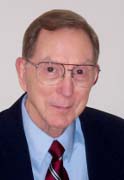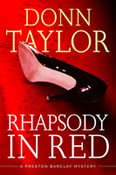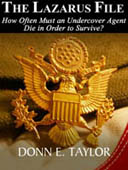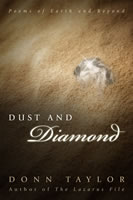Today I have the pleasure of visiting with Donn Taylor, a poet, a novelist,  a professor, and a Korean War veteran. And I’m going to start by asking him about the unusual spelling of his first name. How did that come about, Donn?
a professor, and a Korean War veteran. And I’m going to start by asking him about the unusual spelling of his first name. How did that come about, Donn?
Donn: The story I always tell is that I was programmed as a girl but failed to cooperate. (I get a lot of mail addressed to “Donna.”) The actual story is that my parents added the second “n” to keep me from being called Donald. According to howmanyofme.com, more than nine thousand people in the US share that name, and there are 25 Donn Taylors, none of whom I have ever met.
JRC: It does offer an interesting start to a conversation. Let’s get down to writing. Your first sentence of Rhapsody in Red is, “That Wednesday two weeks before Thanksgiving was a bad day to find a corpse on campus.” Great opening. Was that the first sentence you wrote on this book, or did you add that in during rewriting?
Donn: It was the first sentence I wrote, though I did revise it later for maximum impact.
 JRC: Rhapsody in Red has an unusual feature: the protagonist, Preston Barclay, has musical hallucinations, perhaps reflecting his feelings for his dead wife who was a pianist. Tell us a little about that.
JRC: Rhapsody in Red has an unusual feature: the protagonist, Preston Barclay, has musical hallucinations, perhaps reflecting his feelings for his dead wife who was a pianist. Tell us a little about that.
Donn: I happened to read about musical hallucinations in the NY Times. That is, there are people whose brains experience a constant stream of music that originates there and does not come through the ears. The idea fascinated me, so I researched it and found that Beethoven and Schumann had those hallucinations. It looked like an interesting quirk to give a protagonist, and it let me write a book with, in effect, its own musical score.
JRC: And these musical pieces he hears in his head. They seem to reflect, or rather predict, the mood to come in the story. Is that intended?
Donn: Most definitely. Sometimes the musical references augment the mood of the scene, and sometimes they ironically contrast with it. Barclay says it is like living in a movie that some madman has mismatched with the musical score for another.
JRC: I know you like classical music and played the piano. If you didn’t write fiction and poetry, do you think you’d take up classical piano?
Donn: I would not. I am not (and was not) good enough to perform classical music as it should be performed, and the time required to get anywhere close would preclude other activities. I had to make that decision while I was still teaching and doing literary scholarship. I’m better at fiction and poetry than I ever would have been in music. Every once in a long while I’ve played specials in church when no one else was available, but not recently.
JRC: Is your protagonist, a college professor, anything like you?
Donn: I suppose his love of history parallels my love of history and literature. But Preston Barclay has more nerve than I ever had. In him I built a fictional character who actually says what the rest of the faculty is thinking but doesn’t have nerve enough to say. That’s why he stays persona non grata with the school administration and much of the faculty.
JRC: Any similarities between Overton University and a campus you’ve been on?
Donn: Yes and no. First of all, it isn’t fair for a novelist to present actual people and places in an unfavorable light because they can’t fight back. So Overton University (formerly Overton Grace College) is a generalized representation of many small denominational colleges’ everyday conflicts: traditional academic standards vs. commercialism, education vs. indoctrination, and Christian heritage vs. secularism. The same generalization applies to the state university’s attempts to brainwash Preston Barclay’s daughter: the use of mandatory dormitory social indoctrination sessions is fairly widespread, not limited to any particular school. Despite the heavy implications, the tone of the novel is light and humorous.
JRC: Your latest book is The Lazarus File. Tell us a little about this thriller.
Donn: Actually, Lazarus was my first novel, published by Panther Creek Press in 2002 and now out of print. It’s been re-issued as an e-book by Lighthouse Publishing of the Carolinas. Back in the 1980s at an anti-communist rally, I met The Honorable Lewis Tambs, former U.S. ambassador to Colombia and Costa Rica. (He coined the term narco-terrorism.) He got me interested in the interaction of communist nations, Colombian drug cartels, and Marxist guerrillas. So my protagonist is a CIA agent investigating that interaction while working undercover as a drug pilot. The interlocking plot involves industrial intrigue and kidnapping of a prominent Colombian woman. Together, the man and woman discover a plot to overthrow the Colombian government and grant communist military bases on the Caribbean coast. There’s a preview on my Web site, www.donntaylor.com. Ambassador Tambs enjoyed my putting his strategic concepts in the mouth of a CIA defector. Some of the same characters appear in Deadly Additive, soon to be published by Pelican (Harbourlight).
JRC: You’ve also published poetry. And I believe you’re on the faculty at the Blue Ridge Mountains Christian Writers conference speaking on poetry writing. How would you rate your interests in writing fiction and writing poetry?
 Donn: Blue Ridge has been kind enough to let me teach poetry writing since 2006. My interest is to get people writing good-quality poetry that ordinary educated readers can understand, as opposed to the esoteric stuff being mass-produced in MFA programs. (There’s a column about that on my Web site.) In the past few years I’ve written mostly fiction, which is much easier to write. Writing good poetry takes a lot of concentration and a lot of time to produce even a few lines. Fiction is a better investment of time for me right now.
Donn: Blue Ridge has been kind enough to let me teach poetry writing since 2006. My interest is to get people writing good-quality poetry that ordinary educated readers can understand, as opposed to the esoteric stuff being mass-produced in MFA programs. (There’s a column about that on my Web site.) In the past few years I’ve written mostly fiction, which is much easier to write. Writing good poetry takes a lot of concentration and a lot of time to produce even a few lines. Fiction is a better investment of time for me right now.
JRC: Any advice for the pre-published writer?
Donn: Two important items. The first is patience: it always takes longer than you think it’s going to. Second, learn the craft: don’t be too proud or too stubborn to learn basic rules of grammar and punctuation.
JRC: What’s next on your calendar?
Donn: I have two completed novels to be shopped around. One is a sequel to Rhapsody, and the other is a historical set just after WW II. I’m working on a sequel to the sequel, and I have plans for a sequel to Deadly Additive. Those ought to keep me off the streets and out of trouble for the foreseeable future.
JRC: Sounds like you have plenty on your plate. So, I’ll let you get back to writing. . Thanks for sharing with us, Donn. For the readers, take a look at Donn’s website. He has first chapters of Rhapsody and Lazarus, plus some of his poetry, so you can get hooked. I was

Donn has become one of my favorite authors in ACFW – I have only “met” him online but we’ve had some wonderful conversations.
His Spirituality comes shining through the murky waters of modern Christian publishing as it tries to compete in today’s markets.
Donn is unapologetic in his standards and for that I can truly respect and admire him. He is also very loyal and open about the love he has for his wife. I appreciate that as well as it isn’t something you see all that much – outside of fiction!
Great interview, James.
Thanks for a great interview! I first “met” Donn on The Writers’ View, and I have admired and respected him ever since, both for his literary and historical knowledge and for his depth of character. I am delighted to learn more about Donn and his writing. Thank you for posting this interview.
Blessings,
MaryAnn
_______________________
MaryAnn Diorio, PhD, MFA
http://www.maryanndiorio.com
Very interesting interview – love getting to know more about our friends in the world of writing. Thanks for sharing!
I loved RHAPSODY IN RED and look forward to more from Dr. Donn. Love the story behind his name–thanks for asking that question!
I loved Rhapsody in Red! Wonderful story. Thanks for featuring Donn on your blog. He’s as gracious in person as he is on the page.
Thanks to all of you for your kind comments. My own musical hallucinations are telling me its late afternoon and time to sign off.
Blessings to all,
Donn
I always like to read other writers’ advice. I take a tip here and there and it helps me with a future project. Informative as well as interesting to read.
The musical hallucinations are fascinating, Donn. I have another friend who wrote a mystery about the phenomenon of hearing color. THE WOMAN WHO HEARD COLOR is about WW II and the German Expressionists. Your books all sound great. I look forward to reading your new one.
Donn, you’re a man of many talents – your fiction covers a wide range of subjects. While your other books sound intriguing, “Rhapsody in Red” appeals to me the most. What a fascinating subject for a novel and, of course, it’s a mystery – my cup of tea!
Jim, Rhapsody in Red was one of the first books I reviewed on my own site. I loved it. I can’t wait to read Donn’s latest!